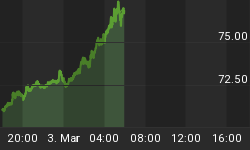Greece hasn't gotten so much press since 146 B.C. when the Romans took over. Of late, Greece sneezes and investors think the U.S. is going to catch the swine flu. Of course, it is not just Greece. Greece is part of the EU and the EMU. So, it is thought that as goes Greece, so goes Europe. And then, the next step is that as goes Europe, so goes the U.S. But is Europe really where the action is with regard to U.S. economic growth?
Let us see what has been happening to U.S. exports of late and how Europe relates to that. Chart 6 shows that in the third and fourth quarters of last year, real U.S. exports of goods increased at annual rates of 24.6% and 28.1%, respectively.
Chart 1
Europe's role in our recent acceleration in export growth has diminished. As U.S. exports increased sharply in the second half of 2009, U.S. exports to Europe as a percent of total U.S. exports fell (see Chart 7). For example, in Q1:2009, Europe's contribution to total U.S. exports was 26.5%; in Q4:2009, it was 23.1%. In contrast, South America and the Pacific Rim excluding Japan have played a more important role in the recent growth in U.S. exports. In Q1:2009, South America and the Pacific Rim ex Japan accounted for 27.8% of total U.S. exports. In Q4:2009, these regions accounted for 31.7% of total U.S. exports (see Chart 8).
Chart 2
Chart 3
The economies in South America and the Pacific Rim excluding Japan are, with the exception of Australia and New Zealand, developing economies. Even before the recession hit, these developing economies accounted for a larger share of total U.S. exports than did European economies. Now that the global economic recovery is underway, these developing economies have increased their share of total U.S. exports. Both because of their absolute size and their growth, the developing economies will play a more important role in the fate of the U.S. economy than will Greece, in particular, and Europe, in general.
















